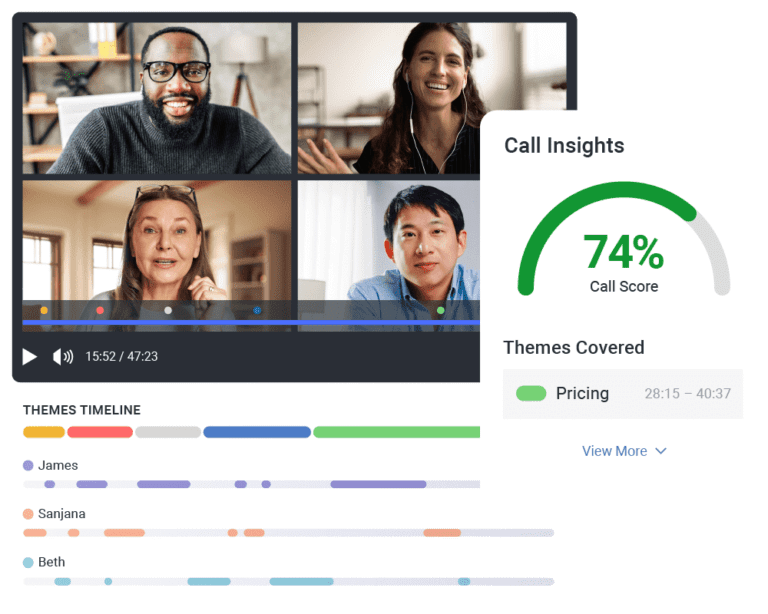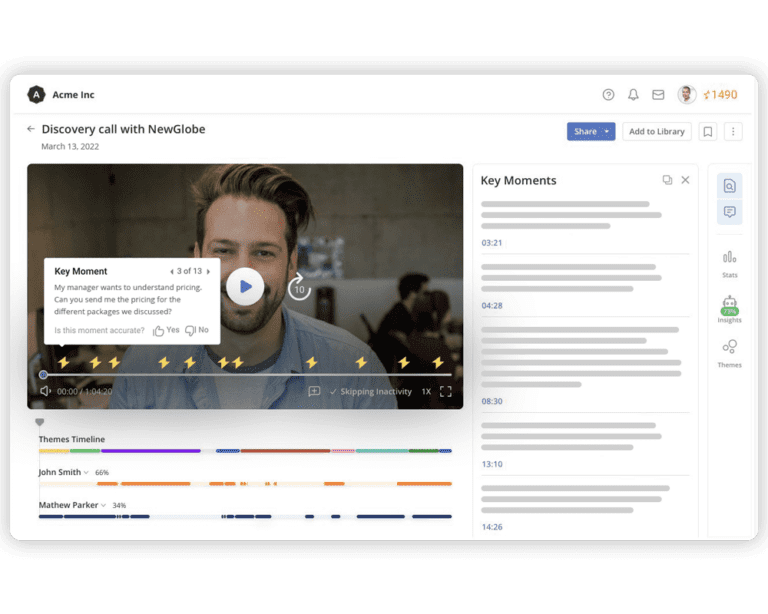How Managers Can Use Conversation Intelligence For Sales
![]() Lindsey Plocek
on
November 20, 2023
Lindsey Plocek
on
November 20, 2023
As conversation intelligence platforms become a cornerstone of the sales tech stack, sales leaders and their teams are exploring how sales managers can use them to boost results and create a team of top performers.
To answer this question, we’ve put together an in-depth analysis of:
- What conversation intelligence is
- Why we believe conversation intelligence is worth the investment
- How conversation intelligence works
- The benefits of this new technology for sales teams
- How managers can use conversation intelligence to improve sales performance
What is conversation intelligence?
Conversation intelligence is a technology that uses artificial intelligence (AI) to review sales conversations and compile data-driven insights for improved sales performance.
It gives your managers and reps a single system of record for elevating rep performance during customer interactions, including:
- Call recordings
- Call scoring and analytics
- Customer sentiment
- In-line coaching
- Best practices
This gives your team a single data model to identify top seller behaviors and a single compliance model that ensures everyone is on the same page, implementing best practices.
Is conversation intelligence worth the investment?
The global conversation AI market is expected to grow at a compound annual growth rate of 21.8%, delivering a market value of USD $18.4B by 2026, according to Markets and Markets.
It gives you complete visibility into what’s happening on deals by analyzing customer conversations on calls and meetings — giving you a 64% increase in revenue generated by reps in their first quarter and a 50% average reduction in new hire onboarding time.
After reviewing these numbers, the real question is: Can you afford not to invest in conversation intelligence?
How does conversation intelligence work?
You’ve no doubt been on a call where a bot is recording the meeting. But what happens with that recording after it’s delivered to a manager’s inbox or stored in the recordings section of a sales platform?
In most organizations: nothing.
But there’s far too much valuable insight there to be ignored or, worse, forgotten about. And that’s where conversation intelligence software comes in.

With this technology, your recordings can be used for more than playbacks. It makes it easy for reps and managers to quickly find information in calls. It also does the heavy lifting of analyzing calls and providing valuable feedback for improving customer experience and overall sales performance.
For reps, it shares actionable insights that allow for self-diagnosis and self-coaching. For new reps, it leads to faster onboarding and skill development. For managers, it gives a high-level overview of the team’s performance as well as data for understanding the behaviors of top performers.
Keep in mind that this technology isn’t spyware for keeping tabs on your reps. It provides deep intelligence that empowers managers and reps to get more done, more efficiently, so they can hit quota and beyond.
With conversation intelligence software, teams are moving deals forward faster and quickly identifying signals that indicate they’re stalling or are ready to close.
It’s also guiding product marketing messaging and offers, so future sales conversations become easier.
The benefits of conversation intelligence for your sales team
Conversation intelligence is often mistakenly compared to a transcription tool, but the benefits go far beyond transcripts. Here are some of the top benefits of using this technology for sales.
At the end of the day, conversation intelligence is about revenue and creating a better experience for the buyer or customer.
It does this by helping reps be better prepared, both before and during calls. It suggests relevant content that reps can review to prepare for calls. And it frees reps to stop taking notes so they can focus on the conversation.
Reps are able to pay more attention to their selling motions and actively listen to the buyer. As a result, the prospect feels like they’re being heard; like their issues are being addressed.
Conversation intelligence tools give sellers one source of record to get their job done. It provides a library of resources and training, benchmarks for their selling behaviors, and actionable metrics on their calls.
This empowers reps to evaluate and coach themselves, so they can level up quickly.
A 2023 Salesforce study found that sellers spend less than 30% of their time selling. The other two-thirds of their time is spent on everything else.
That’s why it’s vital that sellers have a single platform where they find everything they need in just one or two clicks and automation that frees up their time.
Conversation intelligence is a big step in that direction. The platform records their calls, provides feedback and links to useful content, while helping reps track prospect questions and objections.
Managers don’t always have the time and resources to give personalized coaching. But with conversation intelligence, coaching is built into the platform.
Every call is scored, giving reps immediate feedback on strengths and areas for improvement. And managers can quickly add recommendations and constructive feedback when they review calls.
With this level of feedback, reps are able to coach themselves or seek peer-to-peer assistance.
Managers need to coach sellers, perform call reviews, give feedback that impacts performance, keep tabs on pipeline, and make accurate forecasts. For all of these tasks, conversation intelligence does the heavy lifting.
It gives relevant, accurate data on performance, so managers know how to support reps. It automates call scoring, so call reviews are faster and more precise. And it flags moments in calls that signal intent, so it’s easier to keep prospects moving through the pipeline.
The insights available through conversation intelligence are key to every area of revenue, from marketing to sales enablement to customer support. The challenge has been finding an effective way to share that information.
With conversation intelligence, sales data, and competitive intelligence are readily available to any area of your organization.
With the deep insights available through conversation intelligence, reps get the insights they need to become top sellers.
Call scores tell them whether their messaging landed, what the prospect sentiment was, and how they can improve to stay on message.
They can get off one call, review the feedback provided in the system, and understand where they need to improve — then apply that learning to their next call.
Conversation intelligence also helps them understand whether their messaging is landing. This helps them adjust quickly, when needed, to keep deals moving forward.
Conversation intelligence gives real-time data that’s invaluable for understanding what sellers need to succeed. By reviewing the metrics and call scores, you can identify the skills, competencies, and content that need your focus:
- Content needed to move a deal forward
- More accurate customer profiles
- Market research and competitive intelligence
- Pre- and post-call coaching
- Skills exercises and role-plays
What are the best ways for managers to use conversation intelligence?
As you can see, conversation intelligence has the potential to transform your sales team. But it only works if you know how to use it. So let’s explore seven ways managers can use conversation intelligence in their day-to-day activities.
1. Leverage data for better results
Conversation intelligence scores your reps’ calls and highlights key moments, so you can manage your reps’ performance in less time. The data will tell you:
- Are they adhering to MEDDPICC?
- How are they handling objections?
- What questions are they asking and receiving?
- Which competitor mentions are they fielding?
- How are pricing and negotiation conversations handled?
- Are there words that need to be said or avoided?
- Are their deals progressing smoothly?
How to use this intelligence:
Use the data provided in the conversation intelligence platform to help you understand reps’ behaviors. Then leave comments encouraging them, linking to content that can help them, and providing actionable feedback.
Stay alert for trends in calls. If all of your reps are struggling with the same issue, you may need to provide training to improve competencies or alert the leadership team of issues.
2. Study top performers and their processes
Conversation intelligence scores sales calls, so you can quickly identify the key behaviors of your A-sellers:
- What are the themes they talk about
- How do they handle objections and competitor takedowns?
- How many exchanges do they have with a prospect?
This data is valuable for coaching other sellers to uplevel their skills.
How to use this intelligence:
Analyze your top sellers’ calls to identify the behaviors they use consistently to drive results. Use these insights to create a top-seller profile, so the entire team knows the behaviors they need to develop.
3. Faster (and better) onboarding of new team members
It can take six to nine months for new sellers to ramp, and another six months for them to become top performers, according to RAIN Group. And sales managers play a major role in this ramp-up period.
Conversation intelligence allows you to give quick feedback on reps’ performance and suggest content or exercises that will help them level up. By providing immediate, relevant feedback, you can reduce ramp time by as much as 45%.
How to use this intelligence:
Use call scores to identify new reps’ strengths and opportunities. After reviewing calls, add positive and constructive feedback — including inline commentary in their call recordings, so they can understand what they’re doing and how it impacts their performance. And recommend content that will help them boost their skill.
4. Create a continuous coaching culture
Your reps want to succeed. But they need a safe coaching environment, where the entire team works together to improve. With conversation intelligence, you can create that kind of environment.
It gives you a bird’s-eye view of your team’s performance as well as allows deep dives into individual sellers’ performance. It scores each call against best practices, so you understand the competencies that need work.
How to use this intelligence:
Develop quizzes, exercises, and activities that can improve your key performance metrics. Then encourage the team to work together on them.
While you may reward individual seller achievements, focus on the team’s progress. Your goal is to turn C-players into B-players and B-players into A-players.
5. Build seller confidence
Often, sellers are resistant to conversation intelligence technology because it pulls back the curtain on what they’re doing and how they’re doing it. It can feel like Big Brother is watching, making reps afraid of how that will impact their future with your organization.
But conversation intelligence isn’t a performance tracker. It’s a tool designed for sellers to help them succeed. For instance, after implementing this technology:
- Cipla saw more than 30% growth in reps achieving an A-grade.
- Infoblox saw 30% high engagement and 220% increase in completion rates.
- Turing saw a 200% boost in quota attainment year over year.
How to use this intelligence:
It’s important to explain to sellers why you’re implementing conversation intelligence. They need to understand its ability to:
- Increase productivity
- Discover self-coaching and peer-to-peer coaching opportunities
- Gain real-world feedback on their performance
- Collaborate better with other revenue teams
When introducing it to your team, demonstrate how the technology works, and show them how it can be used to help them get more done, in less time, and with better results.
6. Listen to the voice of the market
Conversation intelligence gives a full transcript of every call. It reveals the questions asked and received and captures prospects’ responses.
This gives you deep insight into the market’s needs. It tells you whether your messaging is landing, and reveals the features or benefits you need to lead with.
How to use this intelligence:
Mine sales calls for the specific words used by your prospects to express their needs, desires, and pain points.
As you review calls, listen to the prospect. What are they saying? What does this tell you about the market? These are points of intelligence that need to be shared with leadership, marketing teams, and other departments.

7. Review deals and base forecasts on real evidence
Ultimately, your job is to raise the sales team’s performance to drive consistent revenue growth. With conversation intelligence, you don’t have to depend on sellers’ reports of how their deals are progressing. With just a few clicks, you can review deals and see where they are in the pipeline.
How to use this intelligence:
This technology gives you a 360-degree view of your accounts and opportunities. Use it to keep your finger on the pulse of every deal where it is in the pipeline, how likely it is to move forward, and how fast.
Your forecasts won’t be guesswork. They’ll be based on in-field data. This allows you to give more accurate forecasts and hold yourself and your team accountable.
Bottom line
Conversation intelligence has transformed the sales floor, providing insights to improve onboarding, productivity, and performance.
The biggest challenge is getting sales teams to feel comfortable with this technology. Full transparency can be unnerving.
But if you focus on the benefits of conversation intelligence and the single system of record that elevates rep performance, you’ll get the buy-in you’re looking for.
Essentially, conversation intelligence is the cheat code for success — for managers and reps alike.
Conversation Intelligence in Action
Want to learn more about Mindtickle's conversation intelligence solution, Call AI?
Request a DemoThis post was originally published in August 2022 and was updated in November 2023.


